A five-day workshop aimed at educating farmers and students on the agricultural value chain and innovative agricultural practices has taken place at
A five-day workshop aimed at educating farmers and students on the agricultural value chain and innovative agricultural practices has taken place at the University of Cape Coast (UCC).
It was held by Revenue Diversification Pathways in Africa through its bio-based and circular agricultural Innovations (DIVAGRI) project, a consortium project that aims to increase the productivity, income and economic opportunities of subsistence and smallholder farmers.
This it hopes to do by implementing innovative bio-based solutions that would improve agricultural production, enable diversification of crops and increase value addition, create environmental, social and economic sustainability, and generate new local economic opportunities.
The project has received funding from the European Union Horizon 2020 Programme to provide farmers with tools to sustainably improve farm productivity, profitability, and resilience through improved management of farming resources, output diversification and the creation of high-value circular bio products.
The workshop, on the theme: “Take Care of Your Life,” was part of the Horizon 2020 Framework Programme funded by the European Union.
Innovation
Participants, including farmers and students, were introduced to innovative agricultural practices, including converting crop and animal waste into biogas, among other techniques.
The workshop, which also covered various aspects of soil improvement and crop production to modern marketing strategies, targeted helping participants turn every aspect of farming into a valuable resource.
A senior lecturer from the Department of Agricultural Engineering at UCC and the principal investigator for DIVAGRI, UCC branch, Dr Francis Kumi, said: “We aim to empower individuals eager to start their businesses in agriculture, providing them with the strategic knowledge necessary for success.
We focus on helping them envision their journey and pursue it to the end.” Dr Kumi said UCC was currently exploring six different technologies, including mushroom production, insect farming, intercropping and biogas production.
A beneficiary from the Council for Scientific and Industrial Research-Crops Research Institute in Kumasi-Fumesua, Theophilus Frimpong, said: “The workshop has enlightened me about the importance of having values, goals and a clear vision in my agriculture endeavours.”
He said such workshops would significantly aid in enhancing the agricultural sector in Ghana, adding that his mission was to employ sustainable agricultural practices that benefitted farmers and their communities.
Expressed how the workshop had transformed her perception of farming, a farmer from Mankessim, Mercy Barnes, stated, “Previously, we farmed without any real planning. This workshop has taught us the importance of planning our agricultural activities and improving our communication with clients.”
Mrs Barnes said she was committed to sharing the new insights with fellow farmers in her area who could not attend the workshop.
Advice
A former Provost at the College of Agricultural and Natural Sciences, UCC, Professor Sam Amoah, advised participants to apply the knowledge they had acquired diligently to realise potential benefits, including additional income.
An international private consultant, Nina E. Mapili, who addressed the participants, commended the participants for their active participation and encouraged them to continue practicing what they had learnt.

COMMENTS